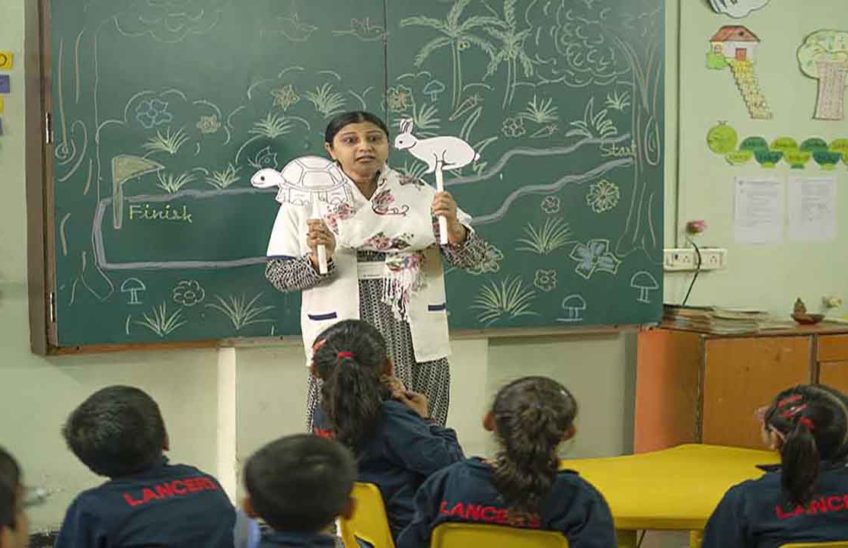
Teachers essential role in education
Teachers play an essential role in education, serving as mentors, guides, and facilitators of learning. Their roles encompass:
1. Knowledge Transfer: Teachers impart subject knowledge and skills, providing students with the necessary tools to understand and excel in various academic disciplines.
2. Motivation: They inspire and motivate students, igniting their curiosity and passion for learning.
3. Guidance: Teachers offer guidance, helping students navigate academic challenges and make informed choices about their education.
4. Facilitating Critical Thinking: They encourage critical thinking and problem-solving skills, fostering independent and analytical minds.
5. Moral and Ethical Development: Teachers instill values, ethics, and a sense of responsibility in students, contributing to their character development.
6. Inclusivity: Teachers create inclusive classrooms, accommodating diverse learning needs and fostering a sense of belonging among students.
7. Mentoring: They serve as mentors, offering emotional support, advice, and guidance, especially during formative years.
8. Holistic Development: Teachers promote holistic development by nurturing social, emotional, and physical well-being in addition to academics.
Responsibilities of a teacher
CBSE board teachers have a multifaceted role that goes beyond classroom instruction. Their responsibilities encompass various aspects of education and student development:
1. Professional Development: Teachers continuously improve their skills through professional development opportunities and staying updated with educational trends.
2. Curriculum Delivery: Teachers are responsible for effectively delivering the curriculum, conveying subject knowledge, and facilitating understanding among students.
3. Lesson Planning: They create lesson plans and instructional materials tailored to the needs and abilities of their students.
4. Classroom Management: Maintaining discipline and creating a positive learning environment are crucial aspects of a teacher’s role.
5. Assessment and Evaluation: Teachers design assessments, grade assignments, and provide feedback to gauge students’ progress.
6. Individualized Support: They identify students’ strengths and weaknesses, offering additional support or challenges as needed.
7. Mentorship: Teachers serve as mentors, guiding and counselling students on academic and personal matters.
How do teachers engage and motivate their students?
Preschool teachers can engage and motivate their students by employing various effective strategies that cater to individual learning styles and needs. Here are some approaches:
1. Make Learning Relevant: Connect lessons to real-life situations, demonstrating the practical applications of what students are learning.
2. Create a Positive Classroom Environment: Foster a safe, inclusive, and welcoming classroom atmosphere where students feel valued and respected.
3. Set Clear Objectives: Communicate learning goals and expectations to students, helping them understand the purpose and relevance of the lesson.
4. Use Varied Teaching Methods: Employ a mix of teaching strategies, including lectures, discussions, group activities, hands-on projects, and multimedia presentations to cater to diverse learning preferences.
5. Encourage Active Participation: Involve students in discussions, debates, problem-solving, and critical thinking activities that require their active engagement.
6. Offer Choice and Autonomy: Allow students to make decisions about their learning when appropriate, such as choosing topics for projects or selecting reading materials.
7. Provide Constructive Feedback: Offer timely and specific feedback to help students understand their progress and areas for improvement.
What qualities make a great teacher?
Great teachers possess a combination of qualities and attributes that go beyond subject knowledge. These qualities enable them to inspire and educate their students effectively. Some key qualities that make a great teacher include:
1. Passion: Great teachers are passionate about their subject matter and teaching. Their enthusiasm is infectious and motivates students to learn.
2. Patience: They demonstrate patience when students struggle with concepts, allowing for individual learning paces and styles.
3. Adaptability: Great teachers adapt their teaching methods to meet the diverse needs and learning styles of their students.
4. Effective Communication: They communicate ideas clearly and effectively, making complex topics understandable to students of varying abilities.
5. Empathy: Great teachers are empathetic, understanding the challenges and emotions students face, and providing support and encouragement.
6. Enthusiasm: They exhibit enthusiasm for teaching and learning, creating an engaging and positive classroom environment.
7. Creativity: They employ creative teaching strategies and innovative approaches to make lessons interesting and memorable.
Frequently Asked Questions
Q. In what ways do great teachers inspire and motivate their students?
A. Great teachers inspire and motivate their students in several ways. They cultivate a love for learning by being passionate about their subject matter and teaching. They set high expectations, believing in students’ abilities and encouraging them to reach their full potential. Great teachers provide individualized support, building students’ confidence. They foster a positive and inclusive classroom environment, where students feel valued and motivated to actively engage in the learning process.
Q. What are the key responsibilities of a teacher?
A. Teachers have multifaceted responsibilities. They must deliver a proper teaching curriculum effectively, manage classrooms, and assess student progress. They create engaging lessons, adapt to diverse learning styles, and provide guidance. Teachers maintain discipline and a positive classroom environment, offering individualized support as needed. They also act as mentors, facilitate learning, and ensure students’ well-being, fostering holistic development. Additionally, teachers contribute to professional growth and community engagement.
Q. How do teachers assess and evaluate student progress?
A. Teachers use various assessment methods to evaluate student progress. These include quizzes, tests, assignments, and projects to gauge academic understanding. Formative assessments provide ongoing feedback, helping teachers adjust instruction. Additionally, teachers consider class participation, discussions, and observations of students’ problem-solving abilities. Summative assessments, like final exams, measure overall comprehension. Continuous assessment and grading systems help teachers track and communicate student progress effectively.



Leave a Reply